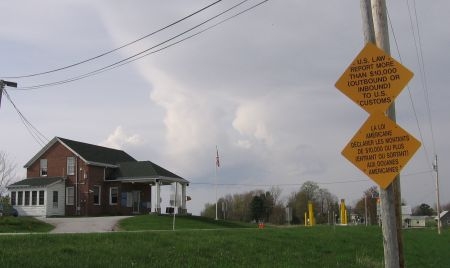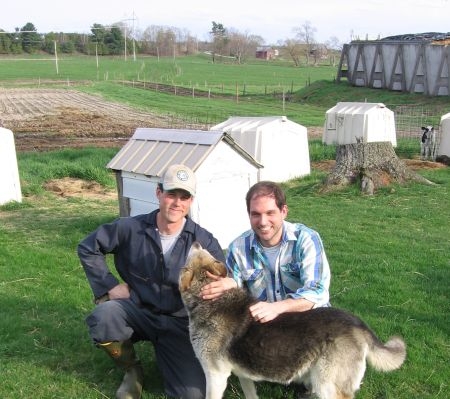
(Host) The federal government has threatened to take a Franklin County farm family to court to seize five acres of their land for a new border crossing.
The government says it needs the property to improve security on the northern border.
But the farmers say it’s their home that needs protection from an over-zealous federal agency.
VPR’s John Dillon reports:
(Five-wheeler sound)
(Dillon) Craig Rainville – wearing blue overalls and farm boots -hauls a load of old fence posts back from the field. He’s tending to early spring chores, and next on the list is feeding the eight black and white calves housed in hutches near the barn.
(Calf feed.. clanking, taps turning and water running)
He’s installed hot and cold water outside right next to the calves, a big time saver at feeding time.
(Rainville) "You try to apply as much ingenuity to the farm as much possible, saves a lot of steps. Makes the place more productive."
(Dillon) Productivity is what a farm – especially a small farm – is all about. The profit margins, if there are any, are thin, and farmers have to make the most of what they have. That’s why Craig Rainville and his family are worried about the government’s plans to seize five acres of their 130 acres of crop land – land the government says is needed to build a new $15 million border station.
The immaculate farm has 75 milkers and about that many young heifers. Rainville says five acres of hay – with three cuts each summer – is a big piece of their self-sufficiency.
(Rainville) "Well, a farm’s not a movie set. You can’t just take a part of it and make it disappear and expect the rest of it to work. There’s a huge culture gap. I think they’re very far removed from their agriculture roots. They don’t see the big picture."
(Dillon) The $15 million project would be paid for with federal stimulus funds. Brian Rainville – Craig’s brother – is a high school history teacher and the family researcher on the project. He goes through a box full of documents, and pulls out the architectural drawings.
(Rainville) "So we’re looking at putting in a stormwater pond, a traffic turnaround, covered parking, three designated traffic lanes, two-stages of radiation detectors, a two story building with a fitness center on the second floor. And room for a helicopter to land out front if it need be. It all strikes me as a little much for Morse’s Line."
(Vehicle fading into distance)
(Dillon) Vermont Route 235 runs by the Rainville farm. Drivers heading north to Canada are supposed to stop at the existing border station, a brick building constructed as a public works project during the Depression.
It’s not a well-traveled road. Morse’s Line is just a dot on the map in the small town of Franklin. In about two hours on a recent afternoon, one truck and two cars go by. And one was a customs officer arriving for his shift.
Brian Rainville says he used the Freedom of Information Act to find out if the new port is necessary.
(Rainville) "We found out that a whopping 14-thousand cars came through the facility the previous year. So I’m not quite sure how Morse’s Line with a traffic rate of 2 ½ cars an hour is a matter of national security and utmost budgetary importance."

(Dillon) Brian Rainville says what the family learned about the traffic numbers has convinced them the border port should be closed – not renovated. He says the money would be better spent improving the busy Highgate port, about ten miles to the west.
But a government report on the border projects says Homeland Security did not look at closing the smaller ports. Rainville reads from the report.
(Rainville) "We could not find any evidence whether the department had ever conducted a study of whether to close particular port of entry.There’s no review process in place. And the next page of the report: ‘Where port facilities are less for example than 20 miles apart, adverse impacts may outweigh the cost to the taxpayers of maintaining a particular port facility."
(Dillon) But the Department of Homeland Security says the Morse’s Line project is vital. In a written statement, a federal official said the existing port is outdated and inadequate. And the official points out that the government worked to reduce the amount of land it needs from ten acres to five.
(Milk Parlor)
(Dillon) By late afternoon, the rhythm of the farm work has shifted to the milking parlor. Clement Rainville, Brian’s father, is moving the animals through, eight Holsteins at a time. The elder Rainville has been here since 1946. And he says the farm has survived because of three generations of hard work and careful management. It’s clear the border project offends his sense of Yankee frugality.
(Rainville) "With this traffic count, you don’t need it. Just plain don’t need it. It’s a tremendous amount of money in this recession to spend for that project."
(Dillon) But the government says the project will serve two purposes – protecting the border and stimulating the economy. A South Burlington company has been awarded a $4.9 million dollar contract for the first phase of the Morse’s Line project.
The Rainvilles say the government doesn’t own the land – and they plan to continue fighting in court.
For VPR News, I’m John Dillon in Franklin, Vermont.